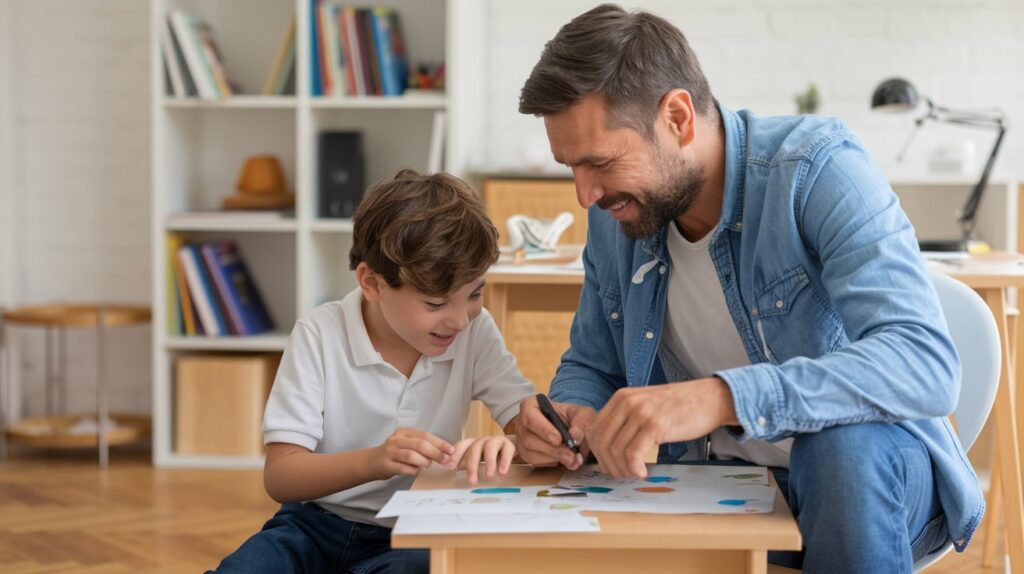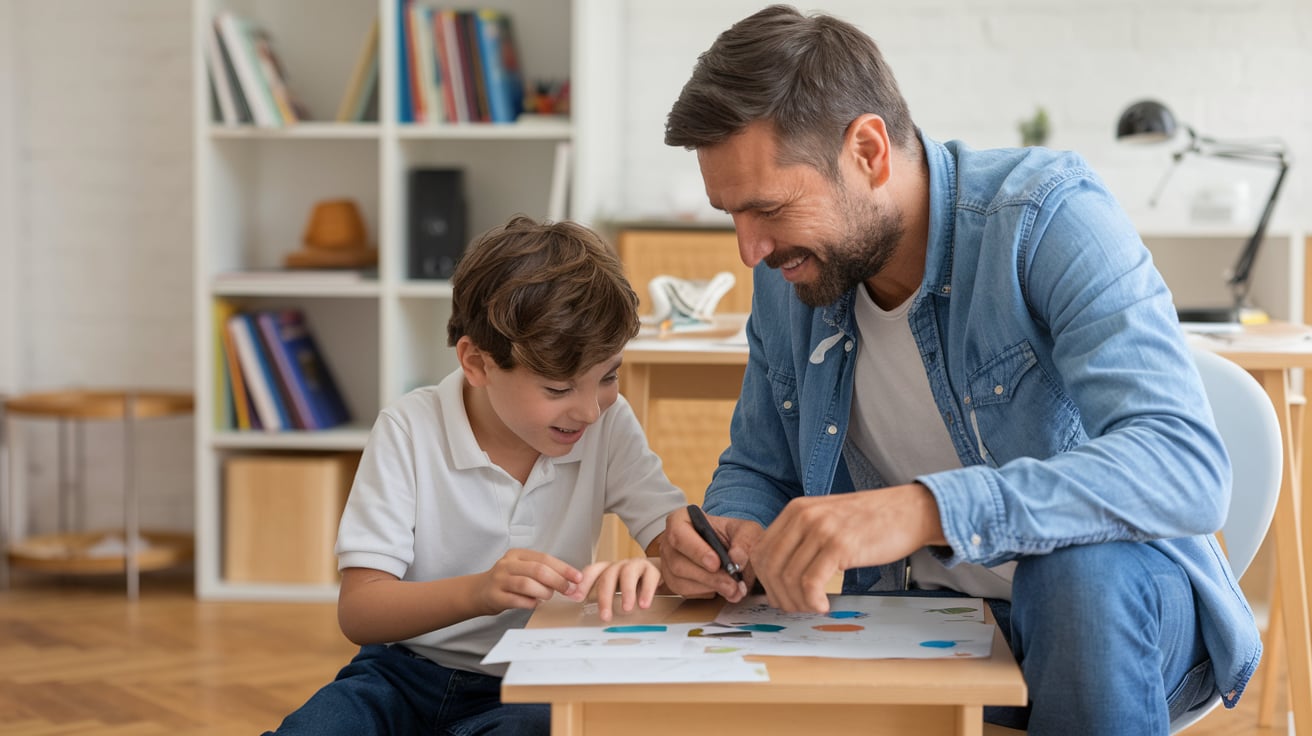
Building Confidence: Low Self-Esteem for Kids
As parents, caregivers, and educators, we play a key role in boosting a child’s self-esteem. Low self-esteem in kids can hold them back in many ways. We’ll look at ways to help Australian children feel good about themselves and grow strong from a young age.
First, we need to know the signs and reasons behind poor self-esteem in children. By creating a caring space, using positive words, and teaching them how to handle tough times, we can help them feel more confident. This way, they can start to believe in themselves and feel sure of their abilities.
Helping kids accept and love themselves is vital for their self-respect and healthy self-image. Let’s explore how to build minors’ self-esteem and youngsters’ self-worth. We want to make sure Australian children grow up with a strong sense of self-worth.
Key Takeaways
- Understand the signs and causes of low self-esteem in Australian children
- Cultivate a nurturing environment to support kids’ self-belief and self-assurance
- Utilise praise and positive reinforcement to boost young people’s self-respect
- Develop resilience and coping skills to help children overcome confidence issues
- Empower kids with self-acceptance and self-love for a healthy self-image
Understanding Low Self-Esteem in Children
It’s vital for kids to feel good about themselves. Sadly, many young Aussies face low self-esteem. This can hurt their confidence, how they interact with others, and their growth. Knowing the signs and reasons behind this is key to helping them.
Signs and Symptoms of Poor Self-Esteem
Children with low self-esteem might act in certain ways, like:
- They doubt their skills and abilities.
- They pull back from social events and talks.
- They often talk down to themselves.
- They find it hard to accept praise.
- They shy away from trying new things.
Causes and Contributing Factors
Low self-esteem in kids can stem from many things:
- Parenting styles: Being too hard on them or not supportive enough can hurt their self-worth.
- Peer relationships: Being bullied, left out, or treated poorly by friends can harm their self-image.
- Societal pressures: Seeing unrealistic images in media and facing high expectations can make kids feel not good enough.
- Traumatic experiences: Going through abuse, neglect, or other traumatic events can really affect their self-esteem.
Knowing the signs and reasons for low self-esteem in kids helps us support them better. This way, they can grow and thrive.
The Importance of Positive Self-Esteem
Helping kids feel good about themselves is key for their happiness and growth. When young people respect themselves, they become confident and strong. They can handle life’s ups and downs.
Positive self-esteem brings many benefits. It helps kids do well in school, make friends, and feel emotionally stable. Kids with good self-esteem try new things, use their strengths, and recover from failures.
- Improved academic achievement and learning outcomes
- Enhanced social skills and positive relationships with peers
- Greater emotional stability and resilience
- Increased motivation and a sense of purpose
- Better overall physical and mental well-being
When kids feel confident, they’re more likely to take risks and find their interests. This helps them grow into well-rounded, happy adults.
“Confidence is the most beautiful thing you can possess.” – Sabrina Carpenter
By focusing on positive self-esteem, we help kids reach their dreams. They grow up strong and ready for life’s challenges.
Fostering a Nurturing Environment
Creating a supportive and nurturing environment is key for little ones to develop self-acceptance and self-love. By making a safe space for them, we help them feel free to be themselves. This builds their confidence and lets them thrive.
Creating a Safe Space for Self-Expression
Ensuring children feel safe to share their thoughts and feelings is vital. We can do this by:
- Encouraging open communication and active listening
- Validating their emotions and perspectives
- Fostering an environment free from judgment or criticism
- Providing a space where they can explore their creativity and interests without fear of ridicule
When little ones feel heard and accepted, they grow with a healthy self-worth and confidence.
Encouraging Healthy Relationships
Nurturing healthy relationships is also crucial for youngsters. By showing positive interactions and setting boundaries, we teach them important skills. This helps them build strong and supportive relationships.
“When children feel valued, accepted, and supported, they are more likely to develop the confidence and resilience they need to navigate life’s challenges.”
By focusing on self-expression and healthy relationships, we empower little ones. They learn to embrace their unique qualities and develop a strong sense of self-acceptance and self-love.
Praise and Positive Reinforcement
Praise and positive reinforcement are key in building self-esteem in kids. These simple tools can greatly change how a child sees themselves and boosts their confidence.
When praising, make sure it’s real, specific, and fits their age. Don’t just say “good job” without reason. Instead, point out their special talents and hard work. This helps them feel proud and accomplished.
Positive reinforcement works well alongside praise. It can be words of encouragement, small rewards, or just noticing their progress. The aim is to make kids feel supported and valued for being themselves.
It’s important not to just praise for the sake of it. We want to genuinely appreciate their achievements and efforts. By doing this, we help kids believe in themselves and their abilities. This builds a strong foundation for their future confidence and resilience.
Low self-esteem for kids
Helping a child feel good about themselves is key to their happiness. Kids with low self-esteem often feel not good enough, doubt themselves, and lack confidence. Parents and caregivers can help by using strategies that fit their age and celebrating their wins.
Age-Appropriate Strategies
How you help a child with low self-esteem depends on their age. Young kids can feel better with positive words, activities that show off their strengths, and a supportive space. As they get older, tweens and teens need to think about themselves, learn how to handle tough times, and deal with social issues.
Celebrating Small Victories
It’s important to notice and celebrate a child’s small wins. It could be mastering something new, facing a fear, or just trying hard. These moments can really help a child feel better about themselves and more ready to try new things.
By using strategies that match their age and always celebrating their progress, parents and caregivers can build a strong sense of self-belief and confidence. This will help them throughout their lives.
Building Resilience and Coping Skills
It’s vital for kids to learn how to handle life’s ups and downs. By teaching them to bounce back from setbacks, we boost their kids’ self-assurance and juvenile self-image. This helps them grow with young people’s self-respect.
Teaching kids to solve problems is a big step. Encourage them to see challenges as chances to learn and grow. Show them how to identify problems, think of solutions, and pick the best one.
It’s also important to help kids talk openly and have a support system. Tell them it’s okay to ask for help from people they trust, like parents or teachers. This builds their kids’ self-assurance and teaches them to ask for help when needed.
Don’t forget to celebrate their wins, no matter how small. Acknowledge their hard work and help them feel proud of what they’ve done. This positive feedback can motivate them to keep growing and facing challenges.
By using these methods, we can help kids develop the resilience and coping skills they need. This way, we support their young people’s self-respect and prepare them for future success.
Addressing Negative Self-Talk
Negative self-talk is a big problem for kids with low self-esteem. It’s those hurtful thoughts that can make a child feel bad about themselves. As parents and caregivers, we need to help kids see and change these negative thoughts into positive ones.
Replacing Harmful Thoughts with Positive Affirmations
Starting to love oneself begins with noticing our thoughts. Teach your kids to listen to their inner voice. Help them change negative thoughts into positive ones.
- Find and tackle issues like “I’m not good enough” or “I can’t do this.”
- Together, swap these for better thoughts, like “I can learn and grow” or “I’m proud of trying my best.”
- Make positive affirmations a daily habit. This helps kids feel more confident in themselves.
Creating a space of self-acceptance and love helps kids beat negative self-talk. It lets them see their real potential.
Developing Talents and Interests
Building a child’s self-esteem is more than just fixing their weaknesses. It’s also about helping them find and grow their unique talents and interests. This way, kids can feel proud of who they are and what they can do.
Finding Passions and Nurturing Strengths
Every child has a special spark inside them. It’s our job to help them find their passions and grow their strengths. This journey is incredibly rewarding, as it lets kids understand themselves better and reach their full potential.
- Encourage kids to try different activities and hobbies, like sports, arts, writing, and coding.
- Watch their interests and talents grow, and give them chances to improve those skills.
- Always celebrate their wins, no matter how small, and show them how far they’ve come.
- Make sure kids feel safe to try new things, make mistakes, and find their passions without fear.
By supporting a child’s talents and interests, we help them build a strong sense of self-confidence. As they get better at new skills and reach their goals, they’ll believe more in themselves. This boosts their self-esteem and helps them grow.
| Talent | Key Benefits |
|---|---|
| Art | Fosters creativity, self-expression, and problem-solving skills |
| Music | Enhances memory, discipline, and emotional intelligence |
| Sports | Develops physical fitness, teamwork, and leadership skills |
| Writing | Improves communication, critical thinking, and self-reflection |
By nurturing a child’s talents and interests, we help them build a strong sense of self-confidence. As they master new skills and achieve their goals, their belief in themselves grows. This positively impacts their overall self-esteem development.
Seeking Professional Support
When dealing with more severe cases of low self-esteem in children, seeking professional help is often necessary. Parents and caregivers can do a lot to boost a child’s confidence. But sometimes, a counsellor or therapist’s expertise is crucial.
Children with ongoing, severe self-esteem issues might need one-on-one counselling. These experts can find out why a child feels bad about themselves. They help the child learn to deal with problems and see themselves in a better light.
Family therapy might also be suggested. It brings the child’s support network together to tackle challenges. Therapists help everyone talk openly and create a caring space for the child’s emotional health.
Parents and caregivers should watch for signs that a child might need professional help. Look for big mood, behaviour, or school changes. Getting help from a mental health expert can help a child build low self-esteem for kids and childhood confidence issues.
“The best way to build children’s youth self-worth is to focus on their strengths and celebrate their children’s self-belief.”
TO WATCH VIDEO CLICK HERE
Empowering Children with Self-Love
It’s vital to help kids feel good about themselves. By teaching them to love themselves, we give them the strength to be confident. They can then celebrate their wins and face tough times with courage.
Teaching kids to accept themselves is key. Let them know their strengths and talents are special. Tell them their worth isn’t based on what others think.
Teaching self-compassion is also crucial. Show kids how to be gentle with themselves when they fail. Help them change negative thoughts into positive ones.
Building a positive self-image is important too. Give kids messages that make them feel valued and beautiful. Avoid criticizing their looks or comparing them to others.
By teaching kids to love themselves, we prepare them for life. They’ll grow up feeling strong, accepted, and proud of who they are. This will help them reach their dreams and be true to themselves.
Conclusion
Reflecting on how we help little ones feel good about themselves shows us how important it is. Understanding when and why kids might feel bad about themselves helps us. We can then create a supportive space for them to grow and feel confident.
We’ve talked about how important it is to praise and support kids. We’ve also seen how helping them find their passions can boost their self-esteem. And when they need extra help, we’ve looked at where they can get it.
The work of building self-esteem is never done, but it’s worth it. Teaching our kids to love and accept themselves sets them up for success. It prepares them to face any challenge with courage and strength.
FAQ
What are the common signs and symptoms of low self-esteem in children?
Signs of low self-esteem in kids include not feeling confident and not wanting to be around others. They might also talk negatively about themselves and not want to try new things. Focusing on weaknesses more than strengths is another sign.
What are some of the potential causes and contributing factors to low self-esteem in children?
Low self-esteem in kids can come from many places. It might be how parents raise them, being bullied, or feeling pressure from society. It can also stem from school struggles or traumatic events. Knowing what causes it helps parents and caregivers help more.
Why is positive self-esteem important for children’s well-being and development?
Positive self-esteem is key for kids’ happiness and growth. It helps them do better in school, make friends, and feel good about themselves. Kids with high self-esteem are brave, resilient, and see the world in a positive light.
How can parents and caregivers create a nurturing environment to support children’s self-esteem?
To help kids feel good about themselves, create a safe space for them to express themselves. Encourage them to make friends and talk openly. Letting them explore their interests and be themselves boosts their self-worth.
What role does praise and positive reinforcement play in building children’s self-esteem?
Praise that is real, specific, and right for their age can really help kids feel better about themselves. Acknowledge their hard work, celebrate their wins, and highlight their strengths. This makes them feel valued and helps them see themselves in a positive light.
How can parents and caregivers tailor strategies to address low self-esteem at different ages?
Helping kids with low self-esteem needs different approaches at different ages. Young kids can build confidence through play and positive words. Older kids need to learn how to handle problems, find their interests, and change negative thoughts to positive ones.
What role does resilience and coping skills play in supporting children’s self-esteem?
Teaching kids to be resilient and handle challenges is vital. It helps them deal with setbacks without losing their self-worth. By teaching them to solve problems, having a growth mindset, and encouraging them to ask for help, kids can grow in confidence and respect for themselves.
How can parents and caregivers address negative self-talk in children?
Helping kids stop negative self-talk is a big step in building their self-image. Work with them to spot and change harmful thoughts. Replace them with positive affirmations to help them accept and love themselves.
How can discovering and nurturing children’s talents and interests support their self-esteem?
Finding and supporting kids’ talents and interests can greatly boost their self-esteem. By giving them chances to grow their skills and celebrating their successes, kids feel more confident and valued. This supports their overall self-image.
When should parents and caregivers seek professional support for a child’s low self-esteem?
If a child’s low self-esteem is severe or doesn’t get better, professional help is needed. Counselling or therapy can help kids overcome their self-doubt and develop a healthy self-image. Knowing when to seek help and finding the right resources is crucial.
TO SEE MORE TOPICS CLICK HERE



